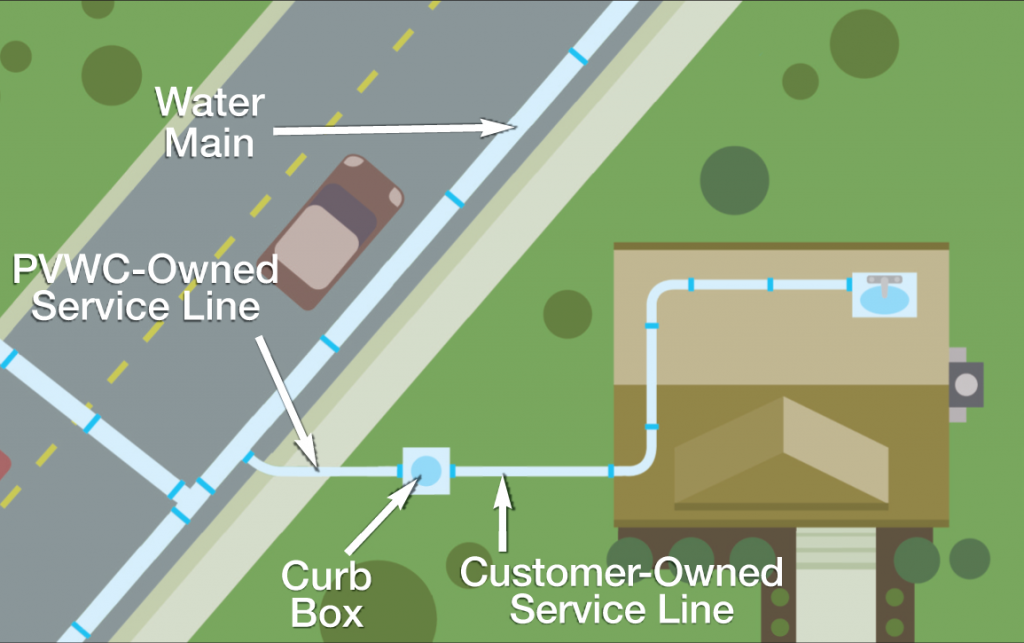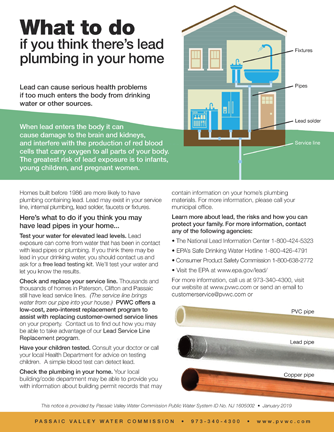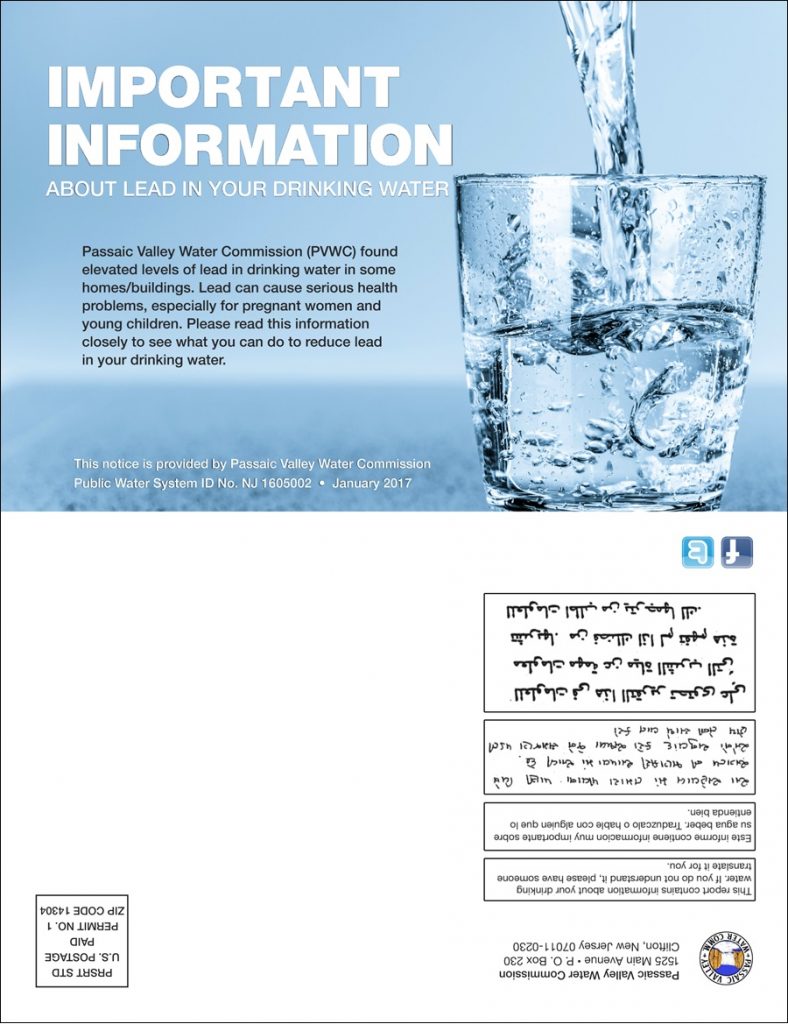IMPORTANT INFORMATION ABOUT LEAD IN YOUR DRINKING WATER
Passaic Valley Water Commission found elevated levels of lead in drinking water in some homes/buildings. Lead can cause serious health problems, especially for pregnant women and young children. Please read this information closely to see what you can do to reduce lead in your drinking water.
HEALTH EFFECTS OF LEAD
Lead can cause serious health problems if too much enters your body from drinking water or other sources. It can cause damage to the brain and kidneys and can interfere with the production of red blood cells that carry oxygen to all parts of your body. The greatest risk of lead exposure is to infants, young children, and pregnant women. Scientists have linked the effects of lead on the brain with lowered IQ in children. Adults with kidney problems and high blood pressure can be affected by low levels of lead more than healthy adults. Lead is stored in the bones, and it can be released later in life. During pregnancy, the child receives lead from the mother’s bones, which may affect brain development.
SOURCES OF LEAD
Lead is a common metal found in the environment. Drinking water is one possible source of lead exposure. The main sources of lead exposure are lead-based paint and lead-contaminated dust or soil, and some plumbing materials. In addition, lead can be found in certain types of pottery, pewter, brass plumbing fixtures, food, and cosmetics. Other sources include exposure in the workplace and exposure from certain hobbies (lead can be carried on clothing or shoes). Lead is found in some toys, some playground equipment, and some children’s metal jewelry.
LEAD IS NOT PRESENT IN THE WATER SUPPLIED TO YOU
When water has been in contact with pipes or plumbing that contains lead for several hours, the lead may enter drinking water. This means the first water drawn from the tap in the morning, or later in the afternoon after returning from work or school, can contain fairly high levels of lead.
Homes built before 1985 are more likely to have plumbing containing lead. New homes may also have lead or lead solder. Even brass faucets, fittings, and valves, including those advertised as “lead-free” may contain some lead.
The Reduction of Lead in Drinking Water Act of 2011, changed the definition of “lead-free” from not more than 8%, to a weighted average of not more than 0.25% lead when used with respect to wetted surfaces of pipes, pipe fittings, plumbing fittings, and fixtures. Visit the National Sanitation Foundation (NSF) website at www.nsf.org to learn more about lead-containing plumbing fixtures.
The U.S. Environmental Protection Agency (EPA) estimates that 10 to 20 percent of a person’s potential exposure to lead may come from drinking water. Infants who consume mostly formula mixed with lead-containing water can receive 40 to 60 percent of their exposure to lead from drinking water.
Don’t forget about other sources of lead such as lead paint, lead dust, and lead in soil. Wash your children’s hands and toys often as they can come into contact with dirt and dust containing lead.
STEPS YOU CAN TAKE TO REDUCE YOUR EXPOSURE TO LEAD IN YOUR WATER
- Run your water to flush out lead. Run your cold water for 30 seconds to 2 minutes or until it becomes cold or reaches a steady temperature before using it for drinking or cooking if it hasn’t been used for several hours. This flushes lead-containing water from the pipes. Flushing usually uses less than one or two gallons of water and costs less than 30 cents per month.
- Use cold water for cooking and preparing baby formula. Do not cook with or drink water from the hot water tap; lead dissolves more easily into hot water. Do not use water from the hot water tap to make baby formula.
- Do not boil water to remove lead. Boiling water will not reduce lead.
- Look for alternative sources or treatment of water. You may want to consider purchasing bottled water or a water filter. If purchasing a water filter, read the package to be sure the filter is approved to reduce lead. You can also contact NSF International at 800-NSF-8010 or visit their website at www.nsf.org for information on performance standards for water filters. Be sure to maintain and replace a filter device in accordance with the manufacturer’s instructions to protect water quality.
- Test your water for lead. Call PVWC at 973-340-4300 to find out how to get your water tested for lead or for a list of local laboratories that have been certified for testing lead.
- Get your child’s blood tested. Contact your local health department or healthcare provider to find out how you can get your child tested for lead if you are concerned about exposure. Your family doctor or pediatrician can perform a blood test for lead and provide you with information about the health effects of lead.
- Identify and replace plumbing fixtures containing lead. A licensed plumber can check to see if your home’s plumbing contains lead solder, lead pipes, or pipe fittings that contain lead. Your local building/code department can provide you with information about building permit records that should contain the names of plumbing contractors who plumbed your home.
- Find out if your service line is made of lead. PVWC maintains records of PVWC-owned materials, such as service lines (water main to curb box), located in the distribution system. Contact our Customer Service Department at 973-340- 4300 for service line materials records.

WHAT HAPPENED? WHAT IS BEING DONE?
Tap water monitoring results from our most recent monitoring study, which took place August through November of 2016, revealed elevated lead levels in some homes/buildings in Paterson, Clifton, Passaic and Prospect Park.
We believe the use of open reservoirs to store treated drinking water contributes to the problem. Open reservoirs prevent the use of phosphate-based corrosion inhibitors, which form a coating on lead pipes, fittings and fixtures to reduce the risk of lead leaching into your drinking water.
PVWC IS TAKING STEPS TO CORRECT THE PROBLEM
- Working to remove all open reservoirs from our system. Open reservoirs are a roadblock to reducing the risk of lead in the drinking water and must be removed from our system. Once all open reservoirs have been replaced, the entire system will receive corrosion control treatment.
- Monitoring the system twice per year through voluntary public involvement in accordance with the requirements of the EPA and NJ Department of Environmental Protection.
- Replacing lead service lines. At one time, there were as many as 34,000 PVWC-owned lead service lines in the system. Over the past few years, we’ve replaced all but a few hundred of those pipes and expect to remove the remaining PVWC-owned lead service lines in the next two years.
- Testing the system on a weekly and monthly basis for parameters that indicate how the corrosion control treatment systems are working.
- Continuing our lead public awareness campaign to keep you informed. Lead information as well as progress updates on the installation of corrosion control treatment is provided each year in our annual water quality report. This report can be found on our PVWC website at pvwc.com.
FOR MORE INFORMATION
For more information, call us at 973-340-4300, email us at customerservice@pvwc.com or visit our website at www.pvwc.com. For more information on reducing lead exposure around your home/building and the health effects of lead, visit EPA’s website at http://www.epa.gov/lead or contact your health care provider.
For additional EPA resources on lead in drinking water contact:
- EPA’s Safe Drinking Water Hotline at 800-426-4791
- National Lead Information Center at 800-424-LEAD (5323)
Your family doctor or pediatrician can perform a blood test for lead and provide you with information about the health effects of lead.
Your local building/code department may be able to provide you with information about building permit records that may contain information on your home’s plumbing materials. Please contact your local municipal office at the following numbers:
Clifton Building Department at 973-470-5809
Passaic Code Enforcement at 973-365-5549
Paterson Building Department at 973-321-1232
Prospect Park Building Dept.: 973-970-7902
Click on the image above to download a PDF of the brochure.
USA Today motion graphic showing how lead can get into your drinking water
PVWC offers lead sample testing free of charge to all of our customers. To have your water tested, please contact our Customer Service Department at 973-340-4300, during regular business hours to schedule a home visit. Our field technician will then visit your home to drop off a water sample bottle and also perform a free evaluation to determine if your incoming water service line contains lead.
Contact Us
Office Hours:
Monday-Friday
7:30 a.m. – 6:00 p.m.
Main Office:
Passaic Valley Water Commission
1525 Main Avenue
Clifton, NJ 07011
Telephone: 973-340-4300
Fax: 973-340-5598
Emergency:
By calling Customer Service 973-340-4300 at any time, day or night, Passaic Valley Water Commission will respond to water emergency situations for you.



